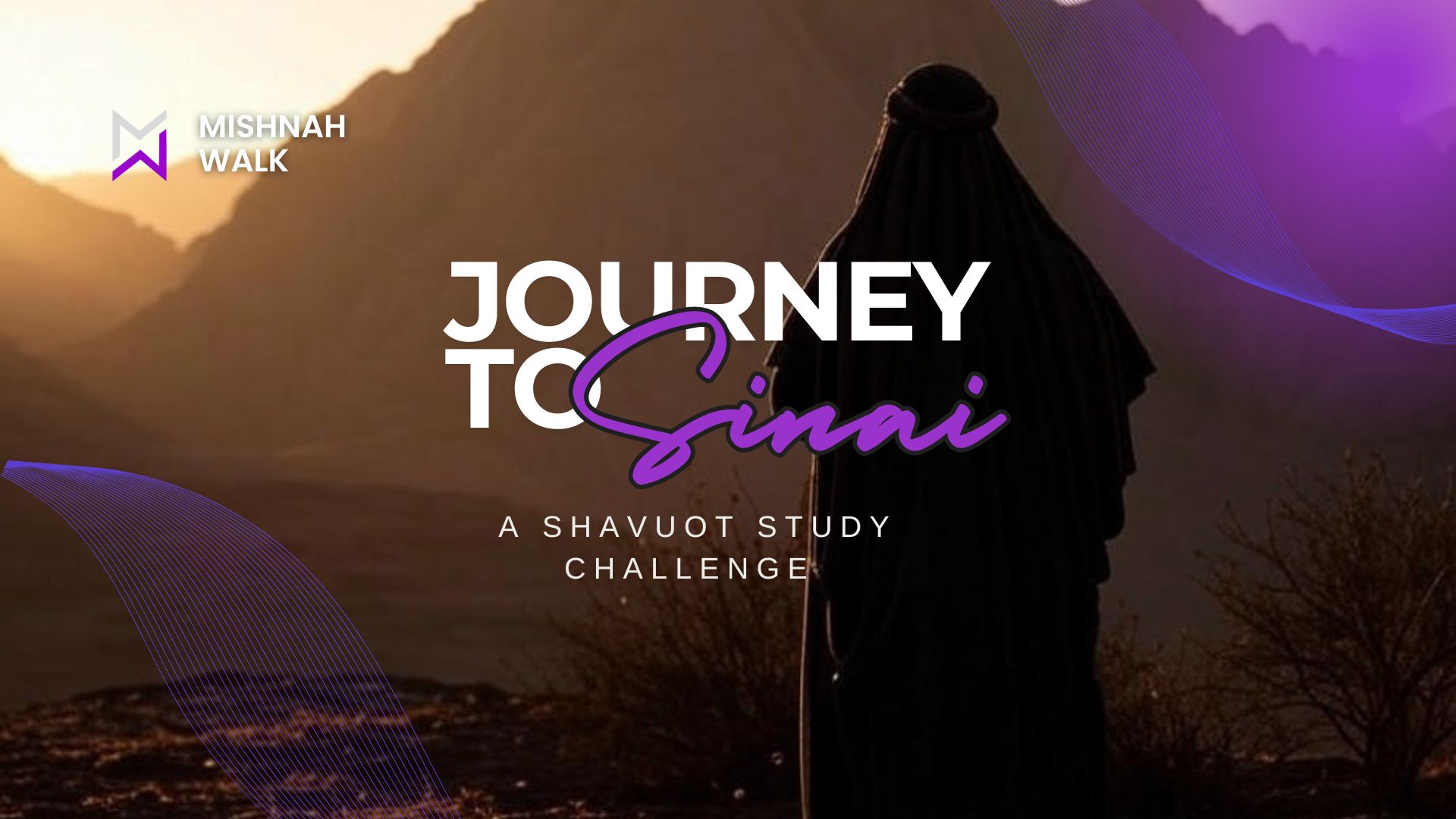
As Shavuot draws near on May 26–28, 2025, we prepare to celebrate Zmahn Matahn Torah-tehnu, the giving of the Torah at Mount Sinai. This festival invites us to stand again at the foot of the mountain, ready to receive God’s wisdom and guidance anew. How do we make ourselves vessels for such a moment? Through Torah study coupled with reflection and action, guided by the classical works of our Sages who made the vast sea of Torah accessible to the masses, the likes of Rav Sa’adia Ga’on and Maimonides and others.
Welcome to the Journey to Sinai: Shavuot Study Challenge, a program from April 21 to May 31, 2025, designed to deepen your spiritual readiness for Shavu’ot. Whether you’re new to Torah study or a seasoned scholar, this challenge offers a structured path to engage with texts central to the holiday: revelation, covenant, and joy. Over six weeks, you’ll dedicate 15–30 minutes daily to Torah, Mishneh Torah, and reflective questions, preparing your heart and mind for the Tiqun Lel Shavu’ot, the Shavu’ot night study tradition. Join our global community, share your insights with #JourneyToSinai and #ShavuotStudyChallenge, and let’s journey to Sinai together.
Why Study for Shavu’ot?
Shavu’ot commemorates the moment God entrusted Israel with the Torah, a gift that Maimonides calls ‘the path to human perfection’ (Guide for the Perplexed 3:51). In Mishneh Torah (Hilkhot Talmud Torah 1:1), he writes, “Every Jewish person is obligated to study Torah,” emphasizing that study is universal and transformative. For Shavu’ot, this duty takes on special urgency. Studying texts like Exodus 19–20 or the Book of Ruth connects us to Sinai’s revelation, while exploring the related sections of Mishneh Torah clarifies the holiday’s guidelines in a holistic and feasible manner: rest, joy, and devotion (Hilkhot Yom Tov 6:1–18). The Journey to Sinai challenge draws on the rationalist approach of classical Torah Judaism championed by the Rambam (Maimonides): Torah study that refines our intellect, aligns us with God’s will, and awakens us to action (Hilkhot Talmud Torah 3:4). By committing to daily study, you’ll not only prepare for Shavu’ot’s ‘Tiqun‘, but also live its ideals, accepting Torah with clarity and purpose, as Israel did thousands of years ago.

Unlock the full Mishnah Walk experience!
Join our community and gain exclusive access to in-depth study resources, guided learning paths, and a vibrant community of learners. Your membership enriches your journey with tools for deeper understanding and personal growth.
The Study Schedule
The challenge begins April 21, 2025, post-Passover, and runs through May 24, aligning with the weeks leading to Shavu’ot. Each week pairs a Torah text with a Mishneh Torah section, offering a balance of narrative, halakha, and philosophy.
Reflective questions kindle the flame of reason planted in each of us, fostering insight and encouraging us to explore Torah’s role in our lives.
Dedicate 15–30 minutes daily, ideally in the evening to echo the Tiqun Lel Shavu’ot. Use Sefaria or a Ḥumash for texts, and adjust the pace to suit your schedule — even brief study is of value! (Hilkhot Talmud Torah 1:8). Below is the full schedule, with tips to make it practical for all.
Week 1 (April 20–26, 2025): Preparing for Revelation
Text: Exodus 19 (~22 verses, Israel’s encampment at Sinai).
Mishneh Torah: Hilchot Yesodei HaTorah 7:1–6 (the nature of prophecy).
Focus: Understand how Israel purified themselves to receive the Torah. Rambam explains prophecy as a rational process, grounding Sinai’s divine encounter in clarity (Hilchot Yesodei HaTorah 7:1).
Reflection: How can I purify my intentions for Shavu’ot, as Israel did?
Tips: – Read Exodus 19 with a clear translation (e.g., Sefaria’s JPS). – Jot down one verse that resonates, perhaps 19:5’s covenant promise. – Journal your reflection: What distractions can you set aside this week? – Beginners: Focus on 19:1–10; advanced learners: Add Talmud, Shabbat 87a (Sinai’s preparations).
Social Media Prompt: Share a verse from Exodus 19 with #JourneyToSinai: “What inspires you about Israel’s readiness?”
Week 2 (April 27–May 3, 2025): The Ten Commandments
Text: Exodus 20 (~17 verses, the Ten Commandments).
Mishneh Torah: Hilchot Yesodei HaTorah 8:1–3 (Sinai’s unique revelation).
Focus: Explore the Torah’s foundational laws, given publicly to ensure their truth (Hilkhot Yesodei HaTorah 8:1). Study the commandments’ structure, duties to God and humanity.
Reflection: Which commandment challenges me most, and why?
Tips: – Read slowly, noting the commandments’ order (e.g., belief in God before Shabbat). – Memorize one commandment in Hebrew (e.g., “Lo tirṣakḥ” for “Do not murder”) to feel its rhythm.
Reflect: How does this commandment shape your ethics?
Beginners: Study 20:1–10; advanced: Cross-reference Hilkhot Yesodeh ha-Torah 1:1–6.
Social Media Prompt: Post your reflection with #ShavuotStudyChallenge: “Which commandment speaks to you today?”
Week 3 (May 4–10, 2025): Shavu’ot’s Laws
Text: Deuteronomy 16:9–12 (~4 verses, Shavu’ot’s biblical laws).
Mishneh Torah: Hilkhot Yom Tov 6:1–6 (festival obligations, no work).
Focus: Learn Shavuot’s halakhic roots, linking harvest to communal joy. Rambam details permitted food preparation, emphasizing rest (Hilkhot Yom Tov 6:2).
Reflection: How does halting work on Shavuot free me to focus on Torah?
Tips: – Cross-reference Leviticus 23:15–21 for Omer context. – Note one halakhic detail (e.g., no creative work except cooking). – Journal: How can rest enhance your Shavuot experience? – Beginners: Read Deuteronomy alone; advanced: Study Hilkhot Ḥaamehṣ U’Maṣah 7:4 (Omer).
Social Media Prompt: Share a Shavu’ot prep idea with #JourneyToSinai: “How will you make time for Torah?”
Week 4 (May 11–17, 2025): Torah’s Perfection
Text: Psalm 19 (~14 verses, praising Torah’s beauty).
Mishneh Torah: Hilkhot Talmud Torah 1:1–11 (duty to study Torah).
Focus: Reflect on Torah’s role in refining character. Rambam mandates study for all, emphasizing clarity and discipline (Hilkhot Talmud Torah 1:2).
Reflection: How does Torah study shape my daily decisions?
Tips: – Read Psalm 19 aloud to feel its poetry; highlight one verse (e.g., 19:8, “The Torah is perfect”).
Journal: How does a verse connect to your life? – Pair with a study partner, as Rambam suggests (Hilkhot Talmud Torah 2:5).
Beginners: Focus on 19:1–9; advanced: Add Guide for the Perplexed 3:51 excerpt.
Social Media Prompt: Post a Psalm 19 quote with #ShavuotStudyChallenge: “How does Torah guide your choices?”
Week 5 (May 18–24, 2025): Joy of Shavu’ot
Text: Psalm 119:1–40 (~40 verses, Torah’s guidance; split over days).
Mishneh Torah: Hilkhot Yom Tov 6:16–18 (festival joy and honor).
Focus: Connect study to Shavu’ot’s celebration. Rambam insists on sharing meals and including others (Hilkhot Yom Tov 6:18).
Reflection: How can I make my Shavu’ot celebration more inclusive?
Tips: Study 5–10 verses daily (e.g., 119:1–8 on day one). – Plan one act of joy: invite a guest, prepare a dairy dish, or share a Torah insight.
Reflect: Who can you include in your Shavu’ot?
Beginners: Read 119:1–16; advanced: Study Hilchot Yom Tov 1:5 (work rules).
Social Media Prompt: Share your Shavuot plan with #JourneyToSinai: “Who’s joining your festive table?”
Week 6 (May 25–31, 2025): Ruth and Redemption
Text: Book of Ruth 1–2 (~44 verses, split over days; harvest and redemption).
Mishneh Torah: Hilchot Me’ilah 8:8 (reasons for mitzvot).
Focus: Prepare for Shavuot’s Torah reading. Rambam encourages exploring mitzvot’s purposes to deepen love for God (Hilchot Me’ilah 8:8). Ruth’s journey mirrors our Torah acceptance.
Reflection: What does Ruth’s story teach me about accepting Torah today?
Tips: Read Ruth with a partner; split chapters (e.g., Ruth 1 on days 1–3). – List one mitzvah to study post-Shavuot (e.g., kindness, from Ruth’s actions).
Journal: How does Ruth inspire your commitment?
Beginners: Focus on Ruth 1:1–16; advanced: Add Megillah 7a (Ruth’s reading).
Social Media Prompt: Post a Ruth insight with #ShavuotStudyChallenge: “What does Ruth teach you about Torah?”
How to Join the Challenge
The Journey to Sinai is flexible, communal, and rewarding. Here’s how to dive in:
- Get the Texts: Use Sefaria (free online) or a Chumash and Mishneh Torah. Print editions work too, check local Judaica stores.
- Set a Time: Study 15–30 minutes daily, ideally evenings. Even 10 minutes counts, per Rambam (Hilchot Talmud Torah 1:8).
- Reflect and Journal: Answer each week’s question in a notebook. Track insights to share during the Tikkun Leil Shavuot.
- Engage Online: Follow prompts on X, Instagram, or Facebook. Share verses, reflections, or study moments with #JourneyToSinai and #ShavuotStudyChallenge. Join our Facebook Group for bonus content like tips, polls, and community discussion.
- Build Community: Study with a friend or form a group. Discuss Rambam’s logic or Ruth’s loyalty over coffee.
- Prepare for Shavuot: By Week 6, plan your Tikkun by selecting texts like Exodus 19, Psalm 119, or Hilchot Yesodei HaTorah 7–8.
Why It Matters
Maimonides teaches that Torah study isn’t just learning—it’s a way to know God and live ethically (Hilkhot Talmud Torah 3:4). This challenge prepares you for Shavuot by weaving study into daily life. You’ll explore Sinai’s revelation, master Shavuot’s halakha, and embrace Ruth’s devotion, all while growing with a global community. By May 26, you’ll approach Shavuot ready to receive Torah with joy and clarity, as if standing at Sinai yourself.
Making the Most of This Challenge
Be sure to join our Facebook group and our membership program! We have lots of bonus content to help you learn and grow through this challenge. Here’s what you’ll get:
The Mishnah Walk Facebook Group – Open to All!
- Connect Freely: Dive into a vibrant community exploring Torah, from Exodus 19 to Ruth, with folks worldwide. Share ideas and questions!
- Weekly Polls: Every Wednesday, vote on fun topics like “What inspires you about Sinai?” (Week 1) and spark lively chats.
- Inspiration Galore: Get updates, tips, and sneak peeks to fuel your Shavuot prep, perfect for any level.
MW Membership – Your Exclusive Study Circle!
- Daily Guided Posts: Enjoy our tailored daily prompts (e.g., “Reflect on Exodus 19:10’s purity”) with study tasks and reflections, just for members.
- Premium Resources: Unlock in-depth Mishneh Torah commentaries (like “Prophecy’s Rational Core”) and downloadable guides (e.g., “Purifying for Sinai”) to deepen your Torah journey.
- Close-Knit Community: Share insights in a cozy, scholar-led, members-only Facebook group to prep for Tikkun Leil Shavuot.
- Plus, all of our fantastic membership perks! Learn more here.
Why wait? Join our public group for open Torah vibes and become a member for exclusive daily study. Let’s walk to Sinai together!
Take the First Step
The Journey to Sinai begins April 21, 2025, with Exodus 19’s call to prepare. No prior experience is needed, just a desire to grow. Open your Chumash, visit Sefaria, and start studying. Share your journey with #JourneyToSinai to inspire others. As Rambam reminds us, “The crown of Torah is ready for all” (Hilchot Talmud Torah 3:1).
Will you join us at Sinai? Comment below, connect on social media, or become a member for more resources. Let’s make this Shavuot a true renewal of Torah.
Share your first reflection with #ShavuotStudyChallenge. See you in Week 1!


Leave a Reply